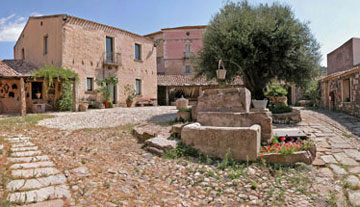
Omu Axiu
I’m in the Argiolas wine cellar, surrounded by wooden barrels made of French oak: shelves and shelves — more than 1,800 bottles — of the wine that’s made headlines not only in Italy but internationally.
Started in 1918 by Francesco Argiolas, the family tradition continues with Francesco’s grandchildren now working in the business. Francesco, 101 years old, is a delight. Attributing his long life to having a glass of Argiolas wine every day, this wide-eyed gentleman in a jaunty cap squeezes my hand with a firm grip indicating years and years of hard work, passion, and persistence. He speaks in Italian, translated by his granddaughter Valentina.
“My grandfather wants to know if you’ve heard of his wines in America,” she says.
Using only indigenous grapes, Argiolas exports 10 wines to the United States. This family business also makes olive oil, pooling their skills into a single passion that unites them: to bring to the world the sun-kissed flavors and scents of Sardinia.
I’m high over the Lanaitto Valley, in the mountains, having lunch with a goat-herder named Giovanni. He is 67 years old and has lived here, alone, for over 50 years.
The dirt road up is snaking and narrow, navigable by four-wheel drive Jeeps owned by a company called Barbagia Insolita. It was one of the Jeeps that brought me here, to this place that feels as if it’s on top of the world. In the forest below, white fluff snows from the trees, showering visitors with a constant spring flower storm. Here, at the top, is Giovanni, roasting a suckling pig on a spit inside his hut.
Giovanni has given each of his 70 goats a name, and they run to him when called. He milks the goats, making cheese in animal bladders hanging from the hut’s ceiling. Giovanni also harvests honey, and makes olive oil. In his shepherd’s hut built of stone and branches, Giavanni makes sausage of wild boar, along with the fresh mozzarella he serves with bread.
Giovanni is not a gregarious man, but his crinkle-lined eyes are full of wisdom and peace. Here, on top of this mountain, he is at home. Giovanni serves lunch on chestnut plates, beneath a bamboo ceiling, with the smells of sizzling pig wafting through the air. His friend, another goat-herder from the other side of the mountain, has joined him today. The friend speaks English, and I ask him about the tiny TV in Giovanni’s solar-paneled hut.
“What’s his favorite program?” I ask, and the friend translates the question to Giovanni.
“He says that he doesn’t have much time to watch, but he does love to watch the news each night,” Giovanni’s friend relates.
I smile and look around the small mountain house in which Giovanni has made his life. There’s a small bed with a painting hung over it, a table with an oilcloth, a refrigerator, and two chairs: one for Giovanni and one for the rare visitor.
“Is he happy here?” I ask, and Giovanni’s friend relays the question. No words are necessary, as the light in Giovanni’s eyes affirms what I already know: Giovanni is happy here, content and satisfied and perfectly at peace, at the top of this mountain, here for 50 years and hopefully for the next 50.
I know just how he feels.
For more information or for assistance in planning a trip to Sardinia, please see
www.italiantravelpromotioncouncil.org or www.italiantourism.com or www.sardegnaturismo.it
This piece appeared previously in WAVE Journey.

